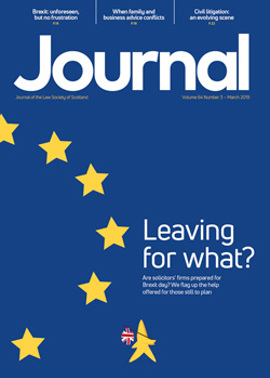Two cases and an order
Since my last briefing, two recent decisions of the Land Court are of particular interest. There have also been changes to sched 5 to the Agricultural Holdings (Scotland) Act 1991 in relation to tenants’ improvements.
Separate “holdings”
C Downie & Son v Scottish Ministers (SLC/8/18, 2 November 2018) was an appeal under the Rural Payments (Appeals) (Scotland) Regulations 2015 against the refusal of a claim under the Scottish Upland Sheep Support Scheme (“SUSSS”). Not only had the ministers refused the claim, they had also imposed a penalty for non-compliance with off-holding movement requirements, equivalent to the amount claimed for: £113,000.
The court concluded that the documentation and records kept by the appellant were wholly insufficient to qualify for SUSSS (paras 9 and 49). But the more interesting questions concerned the interpretation of “holding” and the proportionality of the penalty.
Was “holding” (for the purpose of the applicable regulations) the totality of the land held by the farmer in Scotland, or did each location constitute a separate holding? If the former were correct, there would have been no breach of the regulations because there would have been no movement “off-holding”. Considering the natural meaning of “holding” and the absurdities which would be generated by such an approach, the court took the latter view (paras 56 and 57).
Understandably, the appellant contended that the penalty was excessive, although the court “heard no submission that it was wrong as a matter of law” (para 10). However, “since it is a penalty laid down at EU level, the respondents have no discretion to mitigate it” (para 63). But, in its final paragraph, the court raised the question of whether the penalty was proportionate and whether that question should be referred to the ECJ (para 64). (The appeal was subsequently dismissed by agreement without a further hearing.)
Crofting tenure continued
Highlands & Islands Airports Ltd v Shareholders in Melbost and Branahuie Common Grazings (SLC/153/17, 6 February 2019) concerned an area of ground at Stornoway Airport. Was it still subject to crofting tenure? In short, yes. The effect of this decision is to reiterate that croft land continues to be so, no matter who is using it and for whatever purpose, until it is either decrofted by the landlord or renounced by the crofter(s). But the court left the door open for the parties to return should concrete evidence of the land having been compulsorily purchased come to light.
The applicant wished to dispone some land at the airport to a developer. It sought declarator that three areas of ground were not subject to crofting tenure. That the land had been subject to crofting tenure in the 1930s was not disputed. During the Second World War, it was acquired by the Secretary of State for Air by disposition granted and recorded in his favour.
The applicant’s position was that the land had been acquired by compulsory purchase during the war, which resulted in extinction of the crofters’ rights. In any event, an earlier decision on a post-war minute of agreement and reference concerning the land constituted the necessary court approval for renunciation of crofting rights.
In the event, there was no evidence that compulsory purchase had taken place. The voluntary transfer was likely done against the backdrop of the compulsory powers (para 31), but that did not mean that the legal consequences of a compulsory sale could apply (para 32). The reference to the court could not amount to the necessary approval because that was not what had been asked of the court (para 43). Nor could it constitute tacit approval, for want of argument on the point in an application to which all interested parties had been called (paras 44 and 45).
Schedule 5 variation
The Agricultural Holdings (Scotland) Act 1991 (Variation of Schedule 5) Order 2019 came into force on 10 January. This is the end result of the Tenant Farming Commissioner’s report on modernising the sched 5 list of improvements to agricultural holdings (required by s 37 of the Land Reform (Scotland) Act 2016).
The Commissioner’s recommendations are largely followed: there is no change to part 1 of sched 5 (improvements for which landlord’s consent is required), and some additions and amendments have been made to part 2 (improvements for which notice is required) and part 3 (improvements for which no consent or notice is required), broadly in line with the report. But the recommendation to include “permissions, consents, contracts, authorisations and restrictions” in part 2 has not been taken forward.
In this issue
- How will Brexit affect my mother-in-law?
- Settling the debate on sequestration
- Taking wellbeing seriously
- How will personal data continue to flow after Brexit?
- Buildmark, and a little extra help for NHBC
- Reading for pleasure
- Opinion: Laurie Anderson
- Book reviews
- Profile: Lord Mackay of Clashfern
- President's column
- People on the move
- Is your legal software ready to remain compliant in 2019?
- What's the deal?
- Ready to leave?
- A tapering opportunity
- Brexit: no dealbreaker either
- The business of divorce
- Trailblazing 12
- Cohabitants: rebalancing the law
- Litigation: an evolving scene
- Chain transactions
- When delay is not fatal
- Data protection – deal or no-deal?
- Two cases and an order
- Reshaping trade mark law
- When the wheels come off
- Parentage or privacy?
- Access right, right of access or right of way?
- Team of one
- Public policy highlights
- OPG update
- Housing specialism added to accreditation list
- At the boundary's edge
- Keep the dual role
- Executry and trust accounting: new guidance
- Moving nightmares
- Accredited paralegal update
- Sign up for conference
- Accredited Paralegal Committee profile
- Ask Ash






